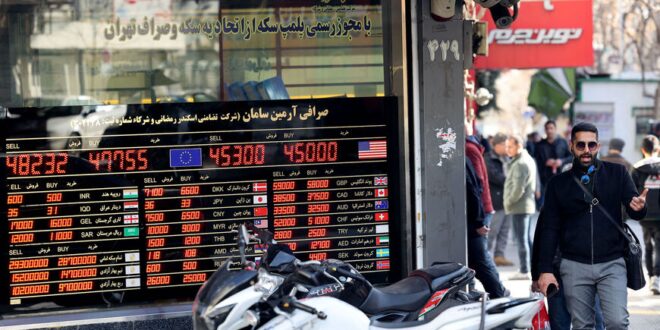Recently launched government plans to restore stability to the troubled foreign exchange market proved no remedy, as ordinary Iranians continue to see their pockets shrink.
At the closure of Iran’s foreign exchange market on Thursday, the country’s national currency, the rial, nosedived to a new record low. A US dollar was traded for 52,650 rials, according to the currency monitor website Bonbast.
The sharp decline occurred despite the latest government measure announced earlier this week to contain the depreciation that has been increasingly worsening since September.
Under the country’s command economy, the Central Bank of Iran (CBI) inaugurated on Tuesday what it called a currency and gold exchange center with the stated aim of managing the retail market for foreign currencies. The plan allows the state to no longer provide currency to “sarrafis,” or private exchangers, leaving currency buyers with the sole option of the government-controlled market.
The measure was the latest introduced by the CBI’s new governor, Mohammad Reza Farzin, who took the helm in December to bring calm back to the market. His tenure has already seen the rial plummet by more than 15%.
In another step to tame the market, the government cut down rations of foreign currencies for travelers embarking on foreign trips. According to the new regulations, they are allowed to buy no more than $500 per trip, leaving many with no option but to return to the free or black market to supply the cash they will need abroad.
The perceived inefficiency of the government measures has drawn criticism even from among loyalists. ILNA reported on Wednesday that at least 50 lawmakers from the Iranian parliament, which is packed with loyalists of President Ebrahim Raisi, were in a push for a formal session to grill him on the parliament floor over the currency crash.
The plummeting of the rial has seen many Iranians rush to the market in an attempt to protect the value of their savings. This, however, has also led to debates that the cash-strapped government could be indeed manipulating the market. Under those arguments, the government — which is losing hope in sanctions relief expected in the revival of the 2015 nuclear deal — is intentionally lowering the rial value, and exploiting the public panic buying of the greenback to earn profit and thus fix its fast-widening budget deficit. The speculation has been rejected by Iran’s Minister for Economic Affairs Ehsan Khandouzi.
Business uncertainties prompted by the soaring prices and their severe impact on daily livelihoods saw at least two protests in Tehran’s Grand Bazaar and at the Alaeldin cell phone market on Wednesday. Videos on social media showed protesters chanting against the government as they complained that their incomes were in rials while prices were calculated based on the dollar value.
While rising prices have over the years turned into a daily routine for middle-class Iranians, a sharp increase in food prices has been particularly biting in recent months. The latest to be hit by the official 47% inflation are meat products, which have witnessed a near doubling in a matter of a fortnight.
One of the few pro-reform and mildly critical papers, Sazandegi, which had managed to still operate under Iran’s stifling media censorship environment, highlighted the skyrocketing meat prices above the fold in its last Saturday edition.
It took a government media supervisory body less than 24 hours to close down the newspaper over “disturbing the public opinion.”
 Eurasia Press & News
Eurasia Press & News




